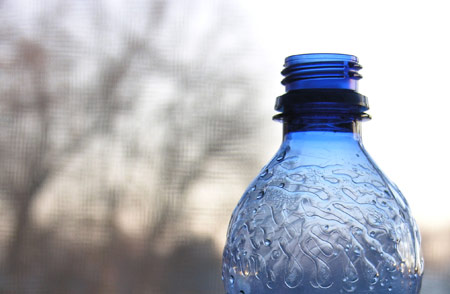
Think that bottle of water you’re drinking is healthy for you? That depends on your definition of healthy. From Time Magazine:
The [National Resources Defense Council] estimates that 4,000 tons of CO2 is generated each year the equivalent of the emissions of 700 cars by importing bottled water from Fiji, France and Italy, three of the biggest suppliers to the U.S.The pollution of the skies is matched by the trash left underfoot. Fewer than a quarter of plastic bottles are recycled, leaving 2 billion lbs. (900 million kg) a year to clog landfills.
2 billion pounds of plastic bottles. 2 billion. How much does an empty plastic bottle weigh? Not much, so think about how many empty plastic bottles make up 2 billion pounds.
ABC News quotes Allen Hershkowitz of the NRDC:
It’s ironic that on some of the labels of the bottles, you see snow-capped mountains and glaciers when in fact the production of the bottle is contributing to global warming, which is melting those snowcaps and those glaciers.
The Pacific Institute, an environmental group, has more jaw-dropping statistics at their website. For instance, the price of a cubic meter of water of California tap water was $0.50 in 2003; the same amount of bottled water in California would have cost $995 in 2003.
But bottled water is healthier than tap water, right? Not according to the NRDC, quoted by National Geographic:
The Natural Resources Defense Council, which carried out a four-year review of the bottled water industry, concluded “there is no assurance that just because water comes out of a bottle, it is any cleaner or safer than water from the tap.”The New York City-based action group added that an estimated 25 percent of bottled water is “really just tap water in a bottle sometimes further treated, sometimes not.”
So how do you weigh the supposed health benefits of bottled water? The water inside the bottle may not be any different than straight tap water; the price you pay for a bottle of water is hundreds-of-times more expensive than tap water, forcing you to throw money away; the cost to the environment from the level of garbage amassed by bottled water is staggering what’s healthy about producing more garbage; and what’s healthy about using more and more oil in a world over-consuming this volatile and non-renewable natural resource? Bottled water has received tremendous hype for being healthier than regular tap water, but all the hype can’t match the reality.
What can we do, though, to help solve, or at least curb, the problem? A greater encouragement of consuming filtered tap water over bottled water would be a start. Another action: greater structured and incentivized municipal recycling programs. What better way to get people motivated to do something than offer them money in return. Several states already do this. More need to. And why can we only recycle plastics labeled with a 1 or a 2? How much plastic is thrown away each year labeled with a 3, 4, or 5?
If something isn’t done, and done quickly and smartly, we’re not only throwing away our bottles and our money, we’re throwing away our future.
(Photo: James Meyer / Stock.xchange)